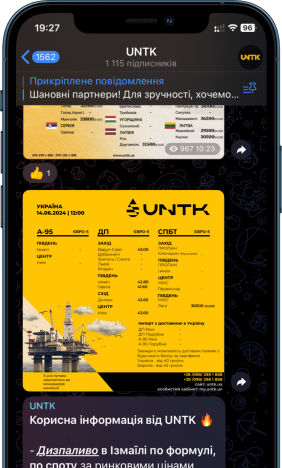

Effective Fuel Procurement Planning: How to Avoid Unforeseen Costs
Fuel procurement is one of the main expenses for many businesses, transport companies, and organizations that rely on a constant supply of fuel for their operations. Given market price fluctuations and unforeseen circumstances, it's essential to have a clear procurement plan in place to minimize costs and avoid financial issues. In this article, we'll discuss how to effectively plan for gasoline and diesel fuel procurement to ensure stable business operations and avoid unexpected costs.
1. Analyzing Fuel Consumption: The Basis for Planning
The first step in effective procurement planning is accurately analyzing fuel consumption. This helps you determine the average fuel consumption for various types of equipment, vehicles, or machinery, and forecast future needs. Consider seasonal demand fluctuations, which may be related to increased travel or peak periods for equipment usage.
2. Procure in Advance: Favorable Conditions and Stable Prices
To avoid unforeseen costs, consider purchasing fuel in advance. By buying fuel in bulk, you can lock in prices for a longer period and avoid sudden market fluctuations. Many suppliers offer favorable terms for regular customers, allowing you to reduce fuel costs in the long term.
3. Choosing a Reliable Supplier
Selecting a reliable supplier is a key factor in ensuring the stability and efficiency of your fuel procurement. Make sure the supplier offers quality fuel and has a good reputation as a trustworthy partner. Also, consider aspects such as delivery flexibility, supply speed, and the availability of contingency options in case of market instability.
4. Integrating Technologies for Cost Monitoring
To plan and control fuel costs accurately, use specialized programs and technologies to monitor consumption. Automated tracking systems help you monitor expenses in real time and identify potential inefficiencies or misuse. This will allow you to keep expenses within the planned budget and ensure more accurate future procurement planning.
5. Creating a Reserve Fund for Unforeseen Costs
Despite the best planning, the fuel market can be unpredictable. Therefore, creating a reserve fund for unforeseen expenses is an important part of the strategy. If fuel prices suddenly rise or delivery issues arise, this fund will help you avoid financial difficulties.
6. Regular Review and Adjustment of the Plan
The fuel market is constantly changing, so it's essential to regularly review and adjust your procurement plans according to new conditions. Analyze prices, consumption, and other factors to stay prepared for changes and maintain the efficiency of your procurement processes.
Effective fuel procurement planning helps avoid unforeseen costs and ensures the smooth operation of your business. It's crucial to understand your fuel needs, choose the right suppliers, and use modern technologies to monitor expenses. By maintaining a reserve fund and adjusting strategies to market changes, you can keep procurement costs under control and reduce the risk of financial challenges.
